-

新人教版高中英语必修3Unit 2 Morals and Virtues-Reading and Thinking教学设计
The topic of this part is “Learn to make choices in life”.The Listening & Speaking & Talking part aims at the moral dilemmas, and this part is about making choices in life. The heroin is Lin Qiaozhi, a famous medical scientist, made a great contribution to our country’s medical care. Most importantly, her life experience can inspire our students whether in studying or the development of career. she had moral dilemmas and life choices, which are similar to the students who will step into society. Besides, Lin has quite good virtues like kindness, self-improvement, insistence, job-loving , generosity and responsibility, which is worth being learned.Concretely, this article is a biography about Lin Qiaozhi. The article tells her whole life according the timeline, among which the life choices is emphasized. For example, whether married or chased her dream, returned home or stayed abroad, family or public, her choices all reflected her faith, spirit, responsibility and devotion.1. Fast reading to get the detailed information about Lin Qiaozhi; careful reading to do the deductive information.2. Learn the reading skills--deductive judgement according the context.3. Study the structure features and language features. 4. Communicate about Lin’s life choices and reflect their own life choices.1. Learn the reading skills--deductive judgement according the context.2. Study the structure features and language features.3. Communicate about Lin’s life choices and reflect their own life choices.Step 1 Lead in---Small talkWhat are some important life choices?Importance choices: university study, jobs and marriage partners. Because they can determine our future.

新人教版高中英语必修3Unit 3 Diverse Cultures-Discovering Useful Structure教学设计
Step 4 PracticeRead the conversation. Find out which words have been left out.Justin: Linlin, I’m going to Guizhou Province next month. I’m super excited! Any recommendations for places to visit?Linlin: Wow, cool! Guizhou is a province with a lot of cultural diversity. Places to visit...well, definitely the Huangguoshu Waterfall first.Justin: What’s special about the waterfall?Linlin: Well, have you ever heard of the Chinese novel Journey to the West ?Justin: Yes, I have. Why ?Linlin: In the back of the waterfall, you will find a cave, which is the home of the Monkey King.Justin: Really? Cool! I’ll definitely check it out.Linlin:And I strongly recommend the ethnic minority villages. You’ll find Chinese culture is much more diverse than you thought.Justin:Sounds great, thanks.Answers:Justin: Linlin, I’m going to Guizhou Province next month. I’m super excited! Do you have any recommendations for places to visit?Linlin: Wow, that’s cool! Guizhou is a province with a lot of cultural diversity. What are some places to visit in Guizhou ? Well, definitely the Huangguoshu Waterfall is the first place to visit in Guizhou Province.Justin: What’s special about the waterfall?Linlin: Well, have you ever heard of the Chinese novel Journey to the West ?Justin: Yes, I have heard of the Chinese novel Journey to the West . Why do you ask if I have heard of the Chinese novel Journey to the West?Linlin: In the back of the waterfall, you will find a cave, which is the home of the Monkey King from Journey to the West.Justin: That’s really true? It’s Cool! I’ll definitely check it out.Linlin:And I strongly recommend the ethnic minority villages on your trip to Guizhou Province. You’ll find Chinese culture is much more diverse than you thought it was.Justin:This all sounds great, thanks.

新人教版高中英语必修3Unit 3 Diverse Cultures-Listening &Speaking&Talking教学设计
1. In Picture 1 and Picture 2, where do you think they are from? How do you know?From their wearings, we can know they are from ethnic minority of China--- Miao and Dong.Picture 1, they are playing their traditional instrument lusheng in their traditional costumes.Picture 2. the girls are Miao because they wear their traditional costumes and silver accessory.2. In Picture 3, can you find which village it is? What time is it in the picture?It is Dong village. It is at night. Step 2 While-listeningJustin met a new friend while traveling in Guizhou. Listen to their conversation and complete the summaries below.Part 1Justin and Wu Yue watched some Miao people play the lusheng. The instrument has a history of over 3,000 years and it is even mentioned in the oldest collection of Chinese poetry. Then they watched the lusheng dance. Justin wanted to buy some hand-made silver/traditional accessories as souvenirs. He was told that the price will depend on the percentage of silver. Part 2They will go to a pretty Dong minority village called Zhaoxing. they will see the drum towers and the wind and rain bridges. They may also see a performance of the Grand Song of the Dong people.Step 3 Post-listening---TalkingWork in groups. Imagine Justin is telling some friends about his trip to Guizhou. One of you is Justin and the rest of you are his friends. Ask Justin questions about his trip and experience. The following expressions may help you.

新人教版高中英语必修3Unit 4 Space Exploration-Listening&Speaking&Talking教学设计一
Listening and Speaking introduces the topic of “talking about how to become an astronaut”. This period is aimed to inform students some details about the requirements of being an astronaut. Students can be motivated and inspired by the astronauts. Teachers ought to encourage students to learn from them and let them aim high and dream big.Listening and Talking introduces the theme of "talk about life in space". This part also informs students more details about life in space and can inspire students to be curious about this job. 1. Guide students to listen for numbers concerning dates, years and ages etc2. Cultivate students' ability to talk about how to become an astronaut and life in space ; 3. Instruct students to use functional sentences of the dialogue such as “ first of all, I am not sure, so what might be .. I guess.. I wonder…I am curious…)appropriately.1. Guide students to understand the content of listening texts in terms of the whole and key details; 2. Cultivate students' ability to guess the meaning of words in listening; discuss with their peers how to become a qualified astronaut and describe the life in space.Part 1: Listening and SpeakingStep 1: Lead inPredictionThe teacher can ask students to predict what the listening text is about by looking at the pictures.About how to become an astronaut./the requirements of an astronautStep 2: Then, play the radio which is about an interview a. And after finishing listening for the first time, the students need to solve the following tasks.

新人教版高中英语必修3Unit 4 Space Exploration-Reading and Thinking教学设计二
The theme of this unit focuses on “space exploration.” Students will learn about the training and experience needed to become an astronaut. The text is mainly about the development of space exploration. On the one hand, the text helps students to have a good understanding about the great feats humans have achieved, on the other hand, they will further understand the contributions that we Chinese have achieved, and feel confident and proud about our homeland and strengthen their love for our country. The teacher should instruct students to aim high and study harder to make great progress in the space career if possible.1. Read about the development and value of space exploration.2. Explore the mysteries of the universe and the achievements in space exploration.3. Skillfully use the vocabulary of this text to cultivate self-study ability 4. Develop cooperative learning ability through discussion.1. Enable the Ss to talk about the development and value of space exploration.2. Guide the Ss to summarize the main idea of each paragraph as well as the main idea of the text.3. Help Ss comprehend the main reasons for space exploration. Multi-media, textbook, notebooks.Step 1: Warming up and predictionLook at the title and the pictures of the text and predict what the text will be about?2. What are the main reasons for space exploration?

新人教版高中英语必修3Unit 4 Space Exploration-Reading for Writing教学设计二
⑦在我看来, 探索太空是值得的。As far as I am concerned, it is worthwhile to explore the space.Step 10 Writing---draftRecently, students in our class have had heated a discussion on whether space is worth exploring. Students hold different ideas about it.30% of us think space exploration is not worthwhile. They think space is too far away from us and our daily life and is a waste of money. And the money spent on space exploration can be used to solve the earth’s problems such as starvation and pollution.On the other hand,70% think space is worth exploring because we have benefited a lot from it,such as using satellites for communication and weather forecast. What’s more,with further space research,we may solve the population problem by moving to other planets one day. Also,space research will enable us to find new sources to solve the problem of energy shortages on the earth.As far as I am concerned, it is worthwhile to explore the space. Not only can it promote the development of society but also enrich our life. Step 11 Pair workExchange drafts with a partner. Use this checklist to help your partner revise his/her draft.1.Does the writer explain why he/she changed/wanted to change?2.Does the writer tell how the changes have improved or will improve his/her life?3.Is the text well-organised?4.Does the writer use words and expressions to show similarities and differences?5.Are there any grammar or spelling errors?6.Does the writer use correct punctuation?

新人教版高中英语必修3Unit 5 The Value of Money-Listening &Speaking&Talking教学设计
4. A:We’d like to have someone to say a word at the beginning to welcome the group.B:↙Who?A:We thought that you or Dr.Johnson might do it.B用降调说Who,其意思是问,对方想让谁在开场时致欢迎词。Step 6 Pronunciation---Practice1. Listen to the short conversation and mark the intonation with ↗, ↙ or ↙, ↗. Then discuss with a partner what they intend to convey by using different intonation.Owner: You know what ?↗ It’s a million-pound bank note↙.Waiter 1: Really ?↗(question)Waiter 2: Really !↙(unbelievable and surprised)Waiter 3: Really ?!↙↗(first question then surprised)2. Listen to the conversations. Underline the parts that are stressed and mark the intonation. Then talk about the implied meanings of the responses with different intonations. Listen again and repeat.1) Henry: It’s a nice suit.Owner: Oh, it’s perfect!↙(The intonation means it is very suitable for Henry.)2) Henry: Well, that’s very kind of you.Owner: Kind, sir ?↗(what you said is not right) No, it’s kind of you. You must come whenever you want and have whatever you like. Just having you sit here is a great honour !!↙(welcome you to come again)3)Henry:Well, to be honest, I have none. Oliver:(happily) What luck!(excited) Brother↗, what luck!↙(It means “Didn’t you hear it?”)Henry: Well, it may seem lucky to you but not to me!↗(angry) If this is your idea of some kind of joke, I don’t think it’s very funny. Now if you’ll excuse me, I ought to be on my way.↙(If so, I would leave.)Roderick: Please don’t go↙...(hope Henry can wait for a moment)Part B Viewing and Talking---Describe people’s changing attitudes in a film clipStep 1 Before-listening---Tell the filmYou are going to watch part of the film The Million Pound Bank Note. Look at these photos and guess what happens in the film.

新人教版高中英语必修3Unit 5 The Value of Money-Reading and Thinking教学设计一
Everybody wants to get wealth.In today’s material world,making money or becoming wealthy symbolizes a person’s success and capability. Many people just make every effort, pay any price to attain greater wealth. With money,they can buy nice, large apartments in nice neighborhood. With money they can own luxurious cars. Wealth seems to bring all happiness in life.But is wealth the only road to happiness? Not really. There are many things in the world, which are beyond the means of money, such as friendship, love, health and knowledge. People are so preoccupied with struggling for money that they have no time or would not take the time to form or maintain friendship. What happiness can they feel living as lonely miserable creatures without love or friends in the world even if they accumulate tremendous wealth?In my opinion, people can’t do anything without money, but money is not everything. What money will bring you depends on your personal belief and goal in life. If you are kind enough to help others, especially the poor, money is a good thing to you. With it, you can do much more for the benefit of people and your country, and it will add to your own happiness. If you want money just for your own needs, you’ll never be satisfied or happy. In a word,you should have money spent for more people. Only then can money be the source of your happiness.Step 8 Homework4 students in a group, one acts Roderick, one Oliver, one servant and the fourth one acts Henry Adams, then listen to the tape, pay more attention to the difference between American English and British English in pronunciation, stress, tone.

新人教版高中英语选修2Unit 4 Journey Across a Vast Land教学设计
当孩子们由父母陪同时,他们才被允许进入这个运动场。3.过去分词(短语)作状语时的几种特殊情况(1)过去分词(短语)在句中作时间、条件、原因、让步状语时,相当于对应的时间、条件、原因及让步状语从句。Seen from the top of the mountain (=When it is seen from the top of the mountain), the whole town looks more beautiful.从山顶上看,整个城市看起来更美了。Given ten more minutes (=If we are given ten more minutes), we will finish the work perfectly.如果多给十分钟,我们会完美地完成这项工作。Greatly touched by his words (=Because she was greatly touched by his words), she was full of tears.由于被他的话深深地感动,她满眼泪花。Warned of the storm (=Though they were warned of the storm), the farmers were still working on the farm.尽管被警告了风暴的到来,但农民们仍在农场干活。(2)过去分词(短语)在句中作伴随、方式等状语时,可改为句子的并列谓语或改为并列分句。The teacher came into the room, followed by two students (=and was followed by two students).后面跟着两个学生,老师走进了房间。He spent the whole afternoon, accompanied by his mom(=and was accompanied by his mom).他由母亲陪着度过了一整个下午。

新人教版高中英语选修2Unit 1 Science and Scientists-Reading and thinking教学设计
Step 5: After learning the text, discuss with your peers about the following questions:1.John Snow believed Idea 2 was right. How did he finally prove it?2. Do you think John Snow would have solved this problem without the map?3. Cholera is a 19th century disease. What disease do you think is similar to cholera today?SARS and Covid-19 because they are both deadly and fatally infectious, have an unknown cause and need serious public health care to solve them urgently.keys:1. John Snow finally proved his idea because he found an outbreak that was clearly related to cholera, collected information and was able to tie cases outside the area to the polluted water.2. No. The map helped John Snow organize his ideas. He was able to identify those households that had had many deaths and check their water-drinking habits. He identified those houses that had had no deaths and surveyed their drinking habits. The evidence clearly pointed to the polluted water being the cause.3. SARS and Covid-19 because they are both deadly and fatally infectious, have an unknown cause and need serious public health care to solve them urgently.Step 6: Consolidate what you have learned by filling in the blanks:John Snow was a well-known _1___ in London in the _2__ century. He wanted to find the _3_____ of cholera in order to help people ___4_____ it. In 1854 when a cholera __5__ London, he began to gather information. He ___6__ on a map ___7___ all the dead people had lived and he found that many people who had ___8____ (drink) the dirty water from the __9____ died. So he decided that the polluted water ___10____ cholera. He suggested that the ___11__ of all water supplies should be _12______ and new methods of dealing with ____13___ water be found. Finally, “King Cholera” was __14_____.Keys: 1. doctor 2. 19th 3.cause 4.infected with 5.hit 6.marked 7.where 8.drunk 9.pump 10.carried 11.source 12.examined 13.polluted 14.defeatedHomework: Retell the text after class and preview its language points

新人教版高中英语选修2Unit 3 Food and Culture-Discovering useful structures教学设计
The newspaper reported more than 100 people had been killed in the thunderstorm.报纸报道说有一百多人在暴风雨中丧生。(2)before、when、by the time、until、after、once等引导的时间状语从句的谓语是一般过去时,以及by、before后面接过去的时间时,主句动作发生在从句的动作或过去的时间之前且表示被动时,要用过去完成时的被动语态。By the time my brother was 10, he had been sent to Italy.我弟弟10岁前就已经被送到意大利了。Tons of rice had been produced by the end of last month. 到上月底已生产了好几吨大米。(3) It was the first/second/last ... time that ...句中that引导的定语从句中,主语与谓语构成被动关系时,要用过去完成时的被动语态。It was the first time that I had seen the night fact to face in one and a half years. 这是我一年半以来第一次亲眼目睹夜晚的景色。(4)在虚拟语气中,条件句表示与过去事实相反,且主语与谓语构成被动关系时,要用过去完成时的被动语态。If I had been instructed by him earlier, I would have finished the task.如果我早一点得到他的指示,我早就完成这项任务了。If I had hurried, I wouldn't have missed the train.如果我快点的话,我就不会误了火车。If you had been at the party, you would have met him. 如果你去了晚会,你就会见到他的。

新人教版高中英语选修2Unit 5 First Aid-Discovering useful structures教学设计
You have no excuse for not going.你没有理由不去。He was punished for not having finished his homework.他因未完成作业而受到惩罚。2.动词ing形式复合结构由物主代词或人称代词宾格、名词所有格或普通格加动词ing,即“sb./sb.'s+doing”构成。动词ing形式的复合结构实际上是给动词ing形式加了一个逻辑主语。动词ing形式的复合结构有四种形式:①形容词性物主代词+动词ing②名词所有格+动词ing③代词宾格+动词ing④名词+动词ingHer coming to help encouraged all of us.她来帮忙鼓舞了我们所有人。The baby was made awake by the door suddenly shutting.这个婴儿被突然的关门声吵醒了。Can you imagine him/Jack cooking at home?你能想象他/杰克在家做饭的样子吗?无生命名词无论是作主语还是作宾语都不能用第②种形式。Tom's winning first prize last year impressed me a lot.汤姆去年得了一等奖使我印象深刻。Do you mind my/me/Jack's/Jack leaving now?你介意我/杰克现在离开吗?Excuse me for my not coming on time.很抱歉我没能按时来。His father's being ill made him worried.他父亲病了,他很担心。We are looking forward to the singer's/the singer to give us a concert.我们盼望着这位歌手来给我们举办一场演唱会。
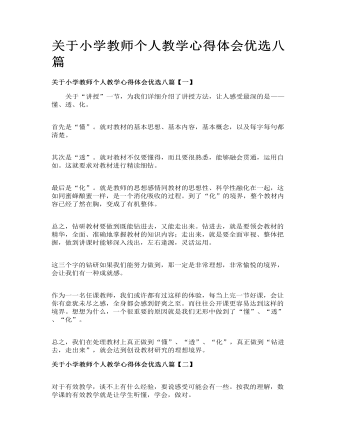
关于小学教师个人教学心得体会优选八篇
作为一一名任课教师,我们或许都有过这样的体验,每当上完一节好课,会让你有意犹未尽之感,全身都会感到舒爽之至。而往往公开课更容易达到这样的境界。想想为什么,一个很重要的原因就是我们无形中做到了“懂”、“透”、“化”。 总之,我们在处理教材上真正做到“懂”、“透”、“化”,真正做到“钻进去,走出来”,就会达到创设教材研究的理想境界。
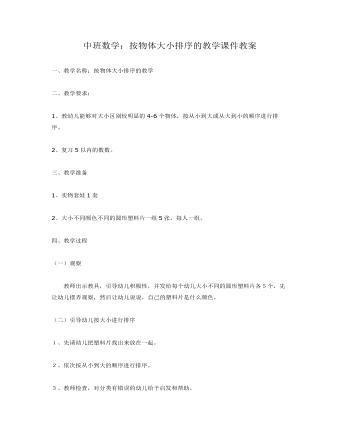
中班数学:按物体大小排序的教学课件教案
二、教学要求:1、教幼儿能够对大小区别较明显的4-6个物体,按从小到大或从大到小的顺序进行排序。2、复习5以内的数数。三、教学准备1、实物套娃1套2、大小不同颜色不同的圆形塑料片一组5张,每人一组。
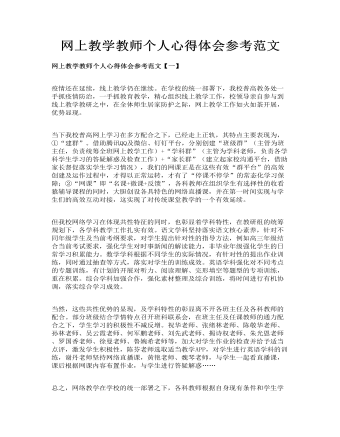
网上教学教师个人心得体会参考范文
但我校网络学习在体现共性特征的同时,也彰显着学科特性,在教研组的统筹规划下,各学科教学工作扎实有效。语文学科坚持落实语文核心素养,针对不同年级学生及当前考纲要求,对学生提出针对性的指导方法,例如高三年级结合当前考试要求,强化学生对时事新闻的解读能力,非毕业年级强化学生的日常学习积累能力。数学学科根据不同学生的实际情况,有针对性的提出作业训练,同时通过抽查等方式,落实对学生的训练成效。英语学科强化对不同考点的专题训练,有计划的开展对听力、阅读理解、完形填空等题型的专项训练,重在积累。综合学科加强合作,强化素材整理及综合训练,将时间进行有机协调,落实综合学习成效。
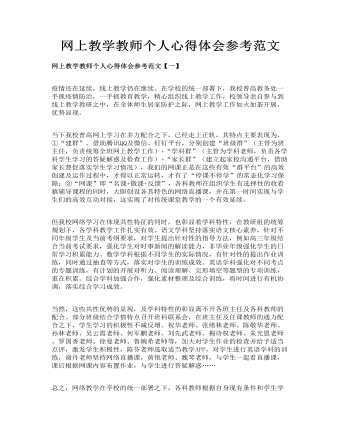
网上教学教师个人心得体会参考范文
但我校网络学习在体现共性特征的同时,也彰显着学科特性,在教研组的统筹规划下,各学科教学工作扎实有效。语文学科坚持落实语文核心素养,针对不同年级学生及当前考纲要求,对学生提出针对性的指导方法,例如高三年级结合当前考试要求,强化学生对时事新闻的解读能力,非毕业年级强化学生的日常学习积累能力。数学学科根据不同学生的实际情况,有针对性的提出作业训练,同时通过抽查等方式,落实对学生的训练成效。英语学科强化对不同考点的专题训练,有计划的开展对听力、阅读理解、完形填空等题型的专项训练,重在积累。综合学科加强合作,强化素材整理及综合训练,将时间进行有机协调,落实综合学习成效。
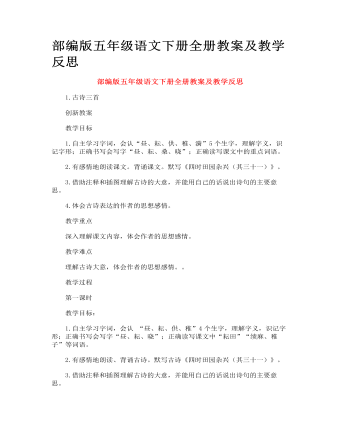
部编版五年级语文下册全册教案及教学反思
初读古诗,整体感知。 1.请同学们用自己喜欢的方式读古诗《四时田园杂兴》(其三十一)。要求借助拼音学会生字,把古诗读正确,读通顺。 2.指名多个学生朗读古诗,师生评议,纠正读得不准确的字音。尤其注意读准“昼、耘”的读音。指导读准多音字“供”([ gōng ]作动词时,准备着东西给需要的人应用:供应、供给(jǐ)、供求、供需、供销、提供、供不应求。[ góng ]奉献:供养、供献、供奉、供佛、供职;祭祀用的东西:供桌、供品、供果、上供;被审问时在法庭上述说事实:招供、口供、供状、供认、供词。)在诗中读四声。 3.把古诗反复多读几遍,通过查字典、问同学、问老师等方式,结合课文注释,理解诗句中词语的意思,用自己的话说说这首诗大体写了什么。记下不理解的地方和不明白的问题。 4.学生自愿举手发言,其他同学进行评议,也可以做补充发言。全班交流,教师相机引导并小结。
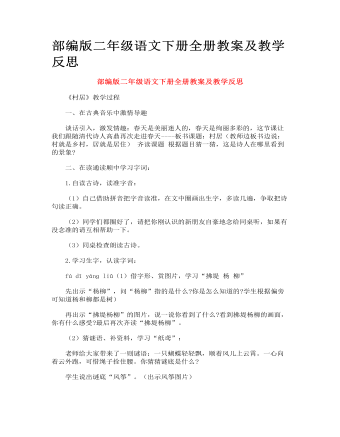
部编版二年级语文下册全册教案及教学反思
在入情入境中诵读成韵 1.配乐范读,想象画面: (1)学生边看插图边听老师配乐朗读,想象诗中所描绘的画面。 (2)学生自由交流想象中的画面,老师激励小结。 预设:山坡上的小草发芽了,嫩绿嫩绿的。黄莺在空中飞来飞去。河堤旁的柳条发芽了,几个下朋友放学回来,趁着东风,赶忙放起了风筝…… 2.借助插图,启发想象:黄莺一边飞一边干什么?(叽叽喳喳地叫)它好像在说什么? 再次启发想象:春风轻轻地吹来,柳条会怎样呢?(轻轻摆动,好像在跳舞陶醉在了美丽的春色里……) 诗人高鼎看到这样的景致写下了这样的诗句:出示“草长莺飞二月天,拂堤杨柳醉春烟”。(学生齐读) 让我们想象着春天的美丽景色,有滋有味地诵读。学生练读、指名读、引读。 3.联系生活,换位体验,:在这样美妙的春光里,沐浴着和煦的春风,(出示儿童放纸鸢图片)孩子们放起风筝,你们放过风筝吗?你放风筝时是怎样的心情?(学生自由发言)
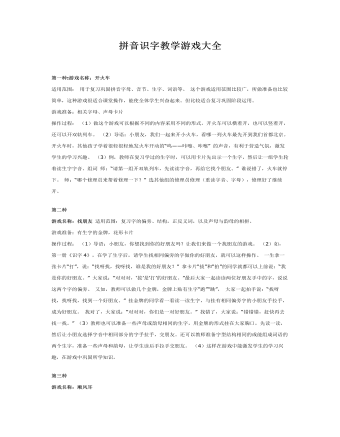
大班游戏教案:拼音识字教学游戏大全
操作过程:(1)做这个游戏可以根据不同的内容采用不同的形式。开火车可以横着开,也可以竖着开,还可以开双轨列车。(2)导语:小朋友,我们一起来开小火车,看哪一列火车最先开到我们首都北京。开火车时,其他孩子学着很轻很轻地发火车开动的“呜——咔嚓、咔嚓” 的声音,有利于营造气氛,激发学生的学习兴趣。(3)例,教师在复习学过的生字时,可以用卡片先出示一个生字,然后让一组学生轮着读生字字音、组词师:“请第一组开双轨列车,先读读字音,再给它找个朋友。” 谁说错了,火车就停下。师:“哪个修理员来帮着修理一下?” 选其他组的修理员修理(重读字音、字母),修理好了继续开。第二种游戏名称:找朋友适用范围:复习字的偏旁、结构,正反义词,以及声母与韵母的相拼。 游戏准备:有生字的金牌,花形卡片 操作过程:(1)导语:小朋友,你想找到你的好朋友吗?让我们来做一个找朋友的游戏。(2)如,第一册《识字4》,在学了生字后,请学生找相同偏旁的字做你的好朋友,就可以这样操作。一生拿一张卡片“打”,说:“找呀找,找呀找,谁是我的好朋友?” 拿卡片“拔”和“拍”的同学就都可以上前说:“我是你的好朋友。” 大家说:“对对对,‘拔’是‘打’的好朋友。”最后大家一起读读两位好朋友手中的字,说说这两个字的偏旁。又如,教师可以做几个金牌,金牌上贴有生字“跑”“跳”,大家一起拍手说:“找呀找,找呀找,找到一个好朋友。” 挂金牌的同学看一看读一读生字,与挂有相同偏旁字的小朋友手拉手,成为好朋友。找对了,大家说:“对对对,你们是一对好朋友。” 找错了,大家说:“错错错,赶快再去找一找。” (3)教师也可以准备一些声母或韵母相同的生字,用金牌的形式挂在大家胸口,先读一读,然后让小朋友选择字音中相同部分的字手拉手,交朋友。还可以教师准备字型结构相同的或能组成词语的两个生字,准备一些声母和韵母,让学生读后手拉手交朋友。(4)这样在游戏中能激发学生的学习兴趣,在游戏中巩固所学知识。
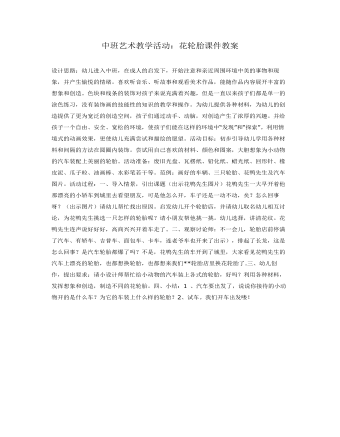
中班艺术教学活动:花轮胎课件教案
为幼儿提供各种材料,为幼儿的创造提供了更为宽泛的创造空间,孩子们通过动手、动脑,对创造产生了浓厚的兴趣。并给孩子一个自由、安全、宽松的环境,使孩子们能在这样的环境中“发现”和“探索”。利用情境式的动画效果,更使幼儿充满尝试和描绘的愿望。活动目标:初步引导幼儿学用各种材料和间隔的方法在圆圈内装饰。尝试用自己喜欢的材料、颜色和图案,大胆想象为小动物的汽车装配上美丽的轮胎。活动准备:废旧光盘、瓦楞纸、铅化纸、蜡光纸、回形针、橡皮泥、瓜子粒、油画棒、水彩笔若干等。范例:画好的车辆、三只轮胎、花鸭先生及汽车图片。